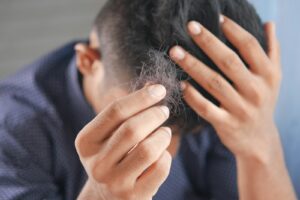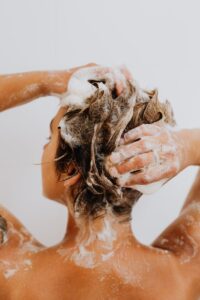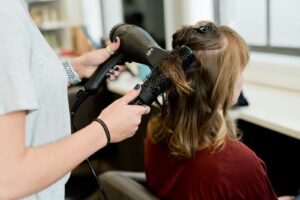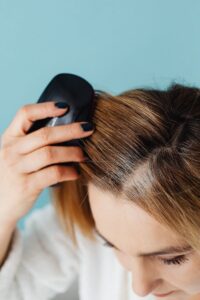Top Tips to Prevent Hair Breakage and Stop Hair Loss for Healthy Hair
Maintaining strong and healthy hair is a common goal for many, yet hair loss and hair breakage can often hinder that aspiration. Understanding the underlying causes of these issues is essential to effectively promote hair growth and maintain healthy hair. This article presents valuable tips and insights to help you care for your hair, prevent damage, and achieve the luscious locks you desire.

Photo by Towfiqu barbhuiya on Unsplash
Understanding Hair Loss and Hair Breakage
Hair loss and hair breakage stem from various factors that can significantly affect the overall health of your hair. While hair loss typically involves a reduction in hair density due to weakened hair follicles, hair breakage refers to the physical damage that causes individual hair strands to split or snap. Identifying these issues requires a keen understanding of your hair type, as different textures may be more susceptible to certain types of damage. Furthermore, your hair care routine plays a pivotal role in either exacerbating or alleviating these conditions.
What Causes Hair Loss?
Several factors can contribute to hair loss, including genetics, hormonal changes, and environmental stressors. Conditions such as alopecia can lead to thinning hair, while excessive heat styling and chemical treatments can damage hair bonds, resulting in hair fall. Nutritional deficiencies, particularly a lack of zinc and keratin, can also weaken hair and lead to hair loss. It is crucial to consult a dermatologist if you are experiencing hair loss to determine the specific causes and explore suitable hair treatments that promote healthy hair growth.
Identifying the Causes of Hair Breakage
Hair breakage can be attributed to several factors, including improper hair care practices and the use of harsh hair products. Frequent washing with strong shampoos may strip the hair of its natural oils, leading to dryness and increased breakage. Additionally, using a fine-tooth comb on wet hair can exacerbate damage, as the hair is more vulnerable at this stage. To protect your hair, consider switching to a wide-tooth comb and using a hydrating conditioner to help maintain moisture levels and prevent hair from becoming overly dry.
Signs of Damaged Hair
Recognizing the signs of damaged hair is key to preventing further breakage and promoting hair health. Common indicators include split ends, excessive frizz, and a lack of shine. If your hair feels rough or looks dull, it may be time for a hair treatment or trim to remove the damaged ends. Additionally, if you notice an increase in hair fall while brushing or washing your hair, it may signal that your hair is not receiving the care it needs to remain strong and healthy. Implementing restorative methods can significantly improve the condition of your hair and encourage healthy hair growth.
Effective Ways to Prevent Hair Breakage

Photo by Photo By: Kaboompics.com on Pexels
Choosing the Right Shampoo and Conditioner
To effectively prevent hair breakage, selecting the right shampoo and conditioner is paramount. Look for products that are sulfate-free and formulated to nourish your specific hair type, whether it be curly, straight, or textured. Shampoos containing natural ingredients can help maintain a healthy scalp while avoiding harsh chemicals that can damage hair. Pair your shampoo with a hydrating conditioner that fortifies hair strands and reduces dryness, providing essential moisture that strengthens hair and promotes healthy hair growth.
Importance of Hair Masks for Repair
Incorporating hair masks into your routine can significantly enhance your hair’s resilience against breakage. These treatments are designed to penetrate deeply, repairing damage and restoring hydration to dry hair. Regular usage of hair masks enriched with proteins, such as keratin, can help rebuild hair bonds and improve the overall health of your locks. Additionally, masks containing oils can provide an extra layer of protection against environmental factors that may lead to hair damage, ensuring that your hair remains strong and healthy.
How to Properly Brush and Comb Wet Hair
Brushing or combing wet hair requires special attention to prevent hair breakage. With hair being most vulnerable when wet, it is advisable to use a wide-tooth comb rather than a fine-tooth brush, as this minimizes the risk of pulling and snapping strands. Start from the ends, gently detangling your hair before working your way up to the roots. This method not only helps maintain hair integrity but also prevents excessive hair fall, allowing you to keep your hair healthy and avoid unnecessary damage.

Photo by Adam Winger on Unsplash
Healthy Hair Care Practices
Regular Hair Trims to Prevent Split Ends
Regular trims are a vital practice in maintaining healthy hair and preventing split ends. Even if you are growing out your hair, scheduling trims every 6-8 weeks can help remove damaged ends and stimulate hair growth. This not only enhances the quality of your hair but also keeps it looking fresh and vibrant. A stylist can assess the length of your hair and suggest the appropriate amount to trim, ensuring that you achieve your desired look while promoting stronger, healthier hair.
Hydration and Nutrition for Healthy Hair
Hydration and nutrition play crucial roles in supporting hair health and preventing hair loss. Drinking ample water keeps your scalp hydrated, which is essential for healthy hair growth. Additionally, a balanced diet rich in vitamins, minerals, and proteins—such as zinc—can significantly contribute to hair strength and vitality. Foods that support keratin production, like eggs and nuts, are especially beneficial for maintaining healthy hair and preventing breakage caused by dryness or nutritional deficiencies.
Using Oils and Treatments to Reduce Dryness
Utilizing oils and specialized treatments can drastically reduce dryness and enhance your hair’s overall condition. Natural oils like argan, coconut, and olive oil are excellent for locking in moisture and shielding hair from sun exposure and other environmental stressors. Applying a serum or leave-in conditioner can also help seal in hydration, making your hair smoother and more manageable. Regularly incorporating these treatments into your hair care routine allows you to protect your hair from damage while promoting its health and sheen.

Photo by Photo By: Kaboompics.com on Pexels
Tips for Maintaining a Healthy Scalp
Scalp Care: The Foundation of Healthy Hair
Scalp care is often overlooked, yet it serves as the foundation for healthy hair growth. A healthy scalp environment promotes stronger hair follicles and prevents hair loss. Regularly washing your hair with a gentle shampoo helps to remove excess oil, dirt, and product buildup, which can lead to scalp issues. Incorporating scalp massages can enhance blood circulation, allowing nutrients to reach hair follicles more effectively. By nurturing your scalp, you directly contribute to the overall health and vitality of your hair.
Folic Acid and Its Role in Hair Health
Folic acid plays a crucial role in maintaining healthy hair and preventing hair loss. This vital B vitamin supports the production of red blood cells, which in turn delivers oxygen and nutrients to hair follicles, promoting hair growth. A diet rich in folic acid—found in leafy greens, beans, and fortified cereals—can significantly strengthen hair strands and reduce the likelihood of thinning hair. Ensuring adequate folic acid intake is an essential step in your journey toward healthier hair.
How Stress Impacts Hair Loss
Stress is a well-known contributor to hair loss, as it can disrupt the natural hair growth cycle and lead to conditions like telogen effluvium, where hair follicles enter a resting phase. High levels of stress may not only cause hair thinning but can also exacerbate existing hair breakage. Practicing stress management techniques, such as yoga, meditation, and regular exercise, can help mitigate its effects on your hair health, allowing you to maintain stronger, healthier strands.
Conclusion: Embracing Healthy Hair Habits
Summary of Key Tips
In summary, maintaining healthy hair involves a holistic approach that encompasses proper scalp care, nutritional support, and stress management. By selecting the right shampoo and conditioner, incorporating hair masks into your routine, and ensuring regular trims, you can significantly reduce hair breakage and prevent hair loss. Additionally, understanding the role of folic acid and the impact of stress will empower you to make informed choices that contribute to your hair’s overall health and growth.
Encouragement to Stay Consistent
Consistency is key when it comes to promoting healthy hair. Establishing a regular hair care regimen not only helps in preventing damage but also supports ongoing hair growth. It may take time to see noticeable results, so remain patient and committed to your routine. Embracing healthy hair habits will not only keep your hair looking great but will also strengthen your confidence in your hair’s appearance over time, making it easier to manage and style.
When to Seek Professional Help
If you find yourself experiencing persistent hair loss or excessive hair breakage despite your best efforts, it may be time to consult a dermatologist or a hair specialist. They can provide personalized recommendations tailored to your specific hair type and condition. Professional guidance can help you discover underlying issues that may be contributing to hair loss and assist in developing an effective treatment plan to restore your hair’s health and vitality. Don’t hesitate to seek help when needed; your hair deserves expert care.
What are the main causes of hair loss and hair breakage?
Understanding the causes of hair loss and hair breakage is crucial for effective prevention. Several factors can contribute to these issues, including genetics, hormonal changes, nutritional deficiencies, and environmental stressors. For instance, excessive heat styling with a straightener or frequent use of harsh shampoo can lead to hair damage and ultimately thinning hair. Additionally, a lack of essential nutrients such as zinc and proteins like keratin can weaken hair follicles and contribute to hair fall. By identifying these causes, you can take proactive steps to maintain healthy hair.
How can I prevent hair breakage and promote hair growth?
To effectively prevent hair breakage and promote hair growth, it’s essential to adopt a comprehensive hair care routine. Start by using gentle shampoo and conditioner formulated for your hair type. Incorporate hair masks and serums into your routine to nourish and hydrate your hair strands. It’s also vital to let your hair dry naturally when possible and avoid excessive heat from styling tools. Regularly trimming your split ends can also help prevent further damage and promote healthier hair.
What are the best tips for healthy hair?
Here are some top tips for healthy hair that can make a significant difference: 1) Use a wide-tooth comb or a soft brush to detangle your wet hair gently. 2) Limit the use of heat styling tools and always apply a heat protectant when you do. 3) Regularly massage your scalp to stimulate blood circulation, which can promote hair growth. 4) Stay hydrated and maintain a balanced diet rich in vitamins and minerals essential for hair health. 5) Protect your hair from sun exposure and harsh weather conditions.

